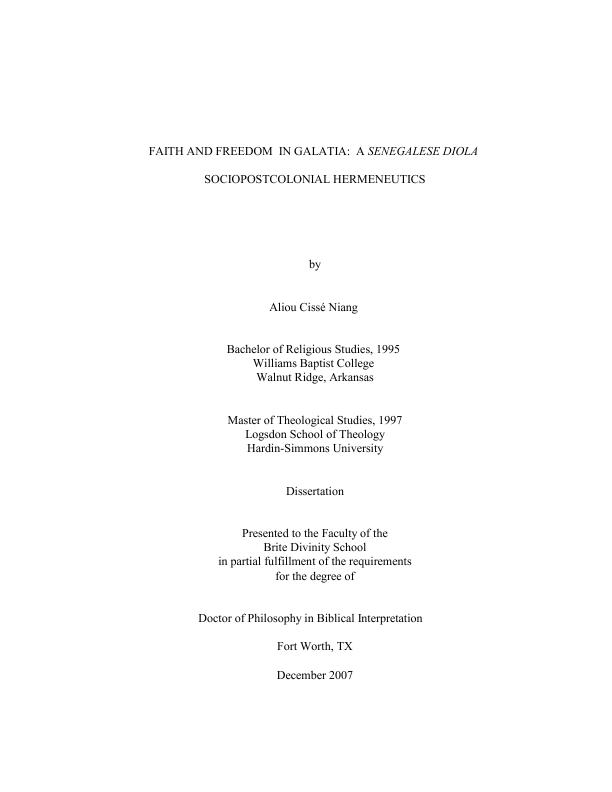Faith and freedom in Galatia: a Senegalese Diola sociopostcolonial hermeneuticsShow full item record
| Title | Faith and freedom in Galatia: a Senegalese Diola sociopostcolonial hermeneutics |
|---|---|
| Author | Niang, Aliou Cisse |
| Date | 2007 |
| Genre | Dissertation |
| Degree | Doctor of Philosophy |
| Abstract | In Faith and Freedom in Galatia: A Senegalese Diola Sociopostcolonial Hermeneutics, Niang argues that the apostle Paul is a "sociopostcolonial hermeneut who acted on his self-understanding as God's messenger to create/form, through faith in the cross of Christ, free communities"--a self definition that echoes some features of ancient Graeco-Roman and modern colonial lore.^This above thesis is bolstered with contributions from social sciences, postcolonial theories, biblical hermeneutics, and an exegetical analysis of Gal 2:11-15 and 3:26-29--a method Niang calls a Senegalese sociopostcolonial hermeneutics.^^The dissertation compares the French colonial objectifications of Diola people, of Senegal, West Africa, in the nineteenth and twentieth centuries to the Graeco-Roman objectifications of the descendents of the ancient Celts (the Gauls/Galatians of Asia Minor) as savage beasts, primitive, irreligious, fickle, bibulous, and warmongering barbarians who threatened civilization; and therefore, must be tamed and civilized/colonized. Insight was drawn from Graeco-Roman writers, modern classicists, epigraphical evidence unearthed in Asia Minor, and ethnographical conclusions on the Diola socioreligious world to show that colonial typologies were overdrawn.^Both Gauls/Galatians and Diola people had their own civilizations re gulated by complex divine judicial systems that required delicate rituals of confessions/reconciliation for wrongdoers. The exegetical and concluding sections emphasize Paul's role in bringing about an alternative mode of community construction.^He does this through a countercolonial story of faith in Jesus Christ that dismantles enslaving and negative colonial typologies, decolonizes and powerfully reshapes the mind of the colonized into free children of God who share a new common identity in Christ--an inclusive and egalitarian people in the community of God (Gal 3:26-29). In response to French colonization, Aline Sitoe, a Diola prophetess, exercised an alternative community construction parallel to that of the apostle Paul.^Niang concludes that Paul was a subversive countercolonist par excellence and sociopostcolonial hermeneutics whose Good News has the power to transform people from their ethnocentric binarism into a new creation. |
| Link | https://repository.tcu.edu/handle/116099117/4009 |
| Department | Brite Divinity School |
| Advisor | Balch, David L. |
Files in this item
This item appears in the following Collection(s)
- Doctoral Dissertations [1485]
© TCU Library 2015 | Contact Special Collections |
HTML Sitemap



